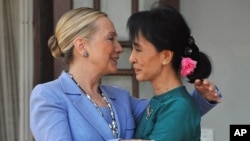Burma’s National League for Democracy leader Aung San Suu Kyi on Friday hosted U.S. Secretary of State Hillary Clinton for what the veteran activist called "a historic moment" for both Burma and the United States.
Following talks with Clinton at her lakeside home, Aung San Suu Kyi told journalists she hoped the visit, (the first by a U.S. secretary of state in over half a century) would renew ties of friendship and understanding.
She said U.S. diplomacy was helping to push for democracy in Burma.
“It is through engagement that we hope to promote the process of democratization," noted the democracy leader. "Because of this engagement, I think our way ahead will be clearer and we will be able to trust that the process of democratization will go forward.”
Related video
Washington has shunned Burma since a 1962 military takeover and, in response to rights abuses, maintains economic sanctions.
But President Obama in 2009 began a two-track policy of continued sanctions coupled with engagement.
Some political analysts have characterized the policy as partly aimed at counterbalancing China’s close relations with the government.
The NLD leader said Burma needs help not only from the U.S. but also from other members of the international community.
Aung San Suu Kyi said she was happy to see China’s foreign ministry issue a statement welcoming U.S. engagement with Burma.
“This shows that we have the support of the whole world," she said. "I’m particularly pleased because we hoped to maintain good, friendly relations with China - our very close neighbor.”
Burmese Democracy Leader Aung San Suu Kyi's compound in Rangoon, December 2, 2011 (VOA Photo - D. Schearf)
The meeting was held at Aung San Suu Kyi’s lakeside home in Rangoon, a crumbling gray and white mansion where authorities kept her under house arrest for 15 years.
She was released a year ago, just days after the first election in two decades brought a military-backed party to power.
Despite his army roots, President Thein Sein surprised critics by allowing more freedoms, holding direct talks with Aung San Suu Kyi and releasing over 200 political prisoners.
Clinton said recent openings by the Burmese authorities gave grounds for encouragement, and that her visit was intended to explore the path forward, with democracy as the goal.
“The United States wants to be a partner with Burma," Clinton said. "We want to work with you as you further democratization, as you release all political prisoners, as you begin the difficult but necessary process of ending the ethnic conflicts that have gone on far too long, as you hold elections that are free, fair and credible.”
Aung San Suu Kyi also stressed more efforts were needed to stop fighting in ethnic minority areas and to establish the rule of law.
“First of all, we need all those who are still in prison to be released and we need to ensure that no more are arrested in future for their beliefs. This is why we put so much emphasis in rule of law," she said. "And I am confident that the United States and our other friends will help us to bring rule of law to this country.”
Clinton said there was much work to be done to develop the country and the U.S. was willing to assist. She also offered a personal note of praise for Aung San Suu Kyi.
“You have been an inspiration. But I know you feel that you are standing for all the people of your country, who deserve the same rights and freedoms of people everywhere," Clinton told the democracy leader. "The people have been courageous and strong in the face of great difficulty over too many years. We want to see this country take its rightful place in the world.”
On the two-day visit Clinton also met with government leaders including President Thein Sein and urged them to expand on the recent reforms.
Photo Gallery: Aung San Suu Kyi's political career




